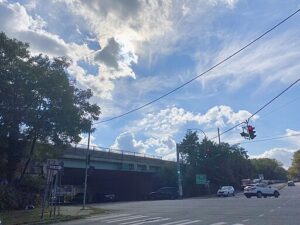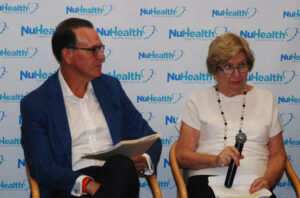By Eric Munson
On Long Island, organizations such as Northwell Health, New York’s largest healthcare provider, Nassau University Medical Center in East Meadow, the A. Holly Patterson Nursing Home in Uniondale and Hofstra University, the largest private university on Long Island, were all able to drastically increase their vaccination rates.
New York State’s deadline for healthcare workers to receive at least one dose of the vaccine was last Sept. 27, according to a statement from Gov. Kathy Hochul.
Dr. David Battinelli, the senior vice president and chief medical officer of Northwell Health, which has 77,000 employees, said that despite his initial concerns about staffing shortages, the organization only fired 1,400 employees who were unwilling to be vaccinated.

At Hofstra University in Hempstead, a team of student Health Ambassadors is working to help ensure that their peers follow university mandates, including a mask mandate. Above, team members pictured last fall. // Photos courtesy Corinne Kyriacou
Battinelli said that at the peak of the pandemic, Northwell had up to 3,500 Covid-19 patients. Before the recent Omicron surge, the health system was down to 200 last fall.
“We had always thought that it was necessary for healthcare workers to be vaccinated,” said Battinelli, who is also a professor of medicine at Hofstra University. “So, we just took it upon ourselves to work through a process.”
Battinelli added that aside from a small group of staffers with religious exemptions and severe allergic reactions to the vaccine, all workers within the health system were vaccinated.
“There was a clear flurry of people vaccinated literally up until the last couple of days before they were to be terminated,” Battinelli said. “I think that was probably because people weren’t entirely sure or might have doubted that they would actually lose their jobs.”
Nassau University Medical Center also increased vaccinations. Dr. Anthony Boutin, the president and chief medical officer of NUMC, said that before the mandate, 75 to 80 percent of the hospital staff had been vaccinated, and 50 percent of staff at A. Holly Patterson Nursing Home, run by NUMC, had been.
Boutin said that when the mandate was announced, he walked through the hospital halls asking colleagues if they were vaccinated. They either said “yes” or “no.” Boutin then told them that if they were unvaccinated, they “may not be able to work” at NUMC.
“That was more to motivate people to make sure that they got the vaccine, and I would talk to them about why it is important to get vaccinated,” Boutin said.
According to Boutin, of the hospital’s 3,400 employees, 89 received religious exemptions.
“There were a few people that didn’t want to get vaccinated,” Boutin said. “So they can’t work here. That number wasn’t very high. I can count it on my hands.”
Both Battinelli and Boutin acknowledged the prevalence of vaccine hesitancy, but both agreed that they were fortunate that relatively few employees had to be fired. Boutin, in particular, credited Hochul’s mandate with encouraging nearly the entire staff to get vaccinated.
Despite the initial controversy, anger and backlash, it appears that in New York, the governor’s mandate worked, accomplishing precisely what Hochul set out to do — increase vaccinations.
However, it was not just hospitals that increased their vaccination rates. Before any state mandates were created, universities had to make their own decisions about vaccines.
Dr. Corinne Kyriacou, an associate professor of public health at Hofstra University, was instrumental in the creation of the Hofstra Health Ambassadors program. She said she believes that similar organizations could be implemented in other communities to provide “a less stressful message” about vaccinations.
“It was a mandate and also that students will be able to come to campus, so there were some students who thought we were going to be online or hybrid, and so we needed to get the message out about the safety and importance of vaccines,” Kyriacou said.
Hofstra Health Ambassadors is a student advocacy group at Hofstra that uses peer education to encourage people to follow social-distancing protocols and to get vaccinated. As of last fall, there were 11 ambassadors, according to Keith Scott, an adjunct professor of population health at Hofstra.
“In addition to the compliance portion of the HHA program, we have [three] student intern/volunteers who help raise awareness about self-care and resiliency initiatives on campus,” Scott said in an email.
Nihal Jacob, a sophomore biomedical engineering at Hofstra, is one of the 11 ambassadors and said that his job mostly involves patrolling around campus to make sure Hofstra students and faculty are following the guidelines.
Jacob said he is concerned about vaccine hesitancy because vaccinations are “the only way to end the pandemic.”
“I know this pandemic has affected our lives a lot, study-wise, being social and everything,” said Jacob, who joined the program after shadowing a cardiologist. “It just kind of got to me. I realized I might as well share that knowledge and make sure everyone wears their mask and follows the rules so we can get out of this.”
Kyriacou said she believes mandates work, but they should really be “the last course of action.” She stressed, though, that the United States has a long history with mandates in schools and certain healthcare settings.
“People have politicized, this and it really has become about our personal lives,” Kyriacou said.









